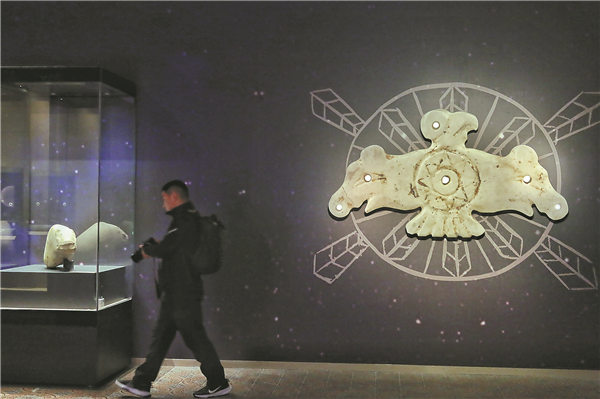

Jade, a gem carrying ancient lore, whispers tales of emerald dreams that reflect how our ancestors saw the world. Its verdant hues also mark a dawn of civilization whose lineage thus becomes visible.
More than 5 millennia ago, people living by the Yangtze River created one of the largest and best-preserved settlements in China. They left a rich legacy of prehistoric jade whose luster still shines.
Since archaeologists first unveiled the Lingjiatan site in 1985, these Neolithic ruins in Hanshan county, Ma'anshan city, Anhui province, have yielded artifacts witnessing the advanced jade craftsmanship, mysterious belief system and a wide network of communication dating back 5,300 to 5,800 years.
The late archaeologist Yan Wenming (1932-2024) once said: "The Lingjiatan people were the vanguards on the path toward civilization."
On the eve of the 40th anniversary marking the Lingjiatan site discovery, a key exhibition lifted its curtain in the Hall of Literary Brilliance (Wenhua Dian) at the Palace Museum in Beijing.
Vanguard of Civilization: Jade Artifacts From the Lingjiatan Culture will run through March 16 and display about 400 artifacts from the Palace Museum's collection and several other museums in Anhui to portray a panorama of this prehistoric cultural hub.
"It's rare for these exhibits to be publicly displayed," says Xu Lin, a jade researcher with the Palace Museum and the chief curator of the exhibition.
"For many researchers who may be familiar with some famous artifacts when writing papers, this is the first time they have seen them.
"As a spectacular repertoire, the exhibition displays Lingjiatan culture and its jade artifacts that demonstrate the splendid Neolithic civilization of China."
Six jade human figurines — three sitting and three standing — are the most recognized items from Lingjiatan. Four of them are now exhibited at the Palace Museum.
"The figurines are exquisitely dressed, with solemn expressions, arms and palms close to the chest and fingers spread apart, resembling a gesture of reverence to a deity," Xu explains.
"They display a state of tranquility and devotion."
"Bracelets" are carved on their arms and, judging from their attire and posture, experts generally consider them to be images of priests within the higher ranks of the social elite.